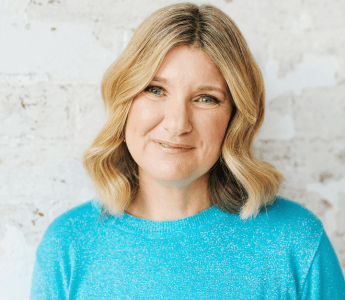
Karen Comer is an author, freelance editor and speaker based in Melbourne. She’s represented by Danielle Binks at Jacinta di Mase Management and Booked Out speakers’ agency. She presents writing workshops to adults and children. Her work as a freelance editor includes fiction for adults and children and non-fiction. Karen writes verse novels – Grace Notes for young adults (Hachette) and Sunshine on Vinegar Street for middle-grade readers (Allen & Unwin) were published in 2023. Sunshine on Vinegar Street recently received a CBCA notable for Younger Readers and Grace Notes made the CBCA shortlist for Older Readers.
Ahead of her workshop on Verse Novels for Young Audiences, Karen answered some questions posed by our Marketing and Communications Officer, Sarah Giles, about all things writing for young readers, productivity, and approaching the verse novel.
What have you read that still plays on your mind?
Karen Ginnane’s young YA Timecatchers duology, When days tilt and When souls tear has wonderfully lyrical language in it to express the mood of her historical London and fantasy Donlon settings and characters. Memorable, indeed!
How do you play with rhythm in your writing? How does rhythm interact with mood and tone in your work?
The variety of rhythm is important to me. For example, in Sunshine on Vinegar Street, I used short, sharp lines to show the increased pace and pressure of a basketball game in contrast with longer, more leisurely lines to show the characters in flow on the court. The measured – and unmeasured – thud of a basketball on a court became the rhythm for the book. Characters in flow were also important in Grace Notes – I used more lyrical, descriptive language to show Grace in flow with her violin and Crux completely immersed in his street art. Rhythm, with its pattern of sounds and movement, can highlight a character’s mood, perhaps with repetition of words to show their individual quirks or with alliteration or assonance to change the pace.
What does your writing routine look like? How do you stay productive?
I write from home, and I mix up writing with freelance editing work. Usually, the balance is more in favour of my freelance editing, and I fit writing in around this. My morning walk is an important part of my creative process – I either listen to a podcast which has relevance to my current work-in-progress or walk with no distractions so I can clear my head. Sometimes I’ll write in a cafe or library to break up my routine. I’m not sure whether I’d call myself productive! I always want to achieve more than I can possibly fit into a day. But when I don’t have a lot of time for writing or I’m not feeling inspired, there’s always research or small tidying-up writing tasks to do. And when I’m deeply immersed in my writing, there’s no need for productivity at all.
How do you keep your voice authentic when writing from the perspective of a very young character?
I do have a tendency to make my characters sound older than they are, so it’s something I check carefully in a later draft. Looking through the diary I wrote when I was 11 helped me with Freya (Sunshine on Vinegar Street). And I am fortunate enough to be surrounded at home by my teenagers and their friends – I listen closely to their conversations and banter.
We’re looking forward to your workshop on Verse Novels for Young Audiences! What is your top tip for writing verse for young adult and middle-grade readers?
Use your fragments. Use those half-sentences, scraps of language, fading-off dialogue, brief lines of description, snippets of a character’s physical description, vague notes, bullet points of action, half-formed ideas typed into your phone, scribbles in the middle of the night. Use your fragments to write a verse novel.
Places are still available in Karen’s workshop, Verse Novels for Young Audiences. Members of Writers Victoria receive up to 37% off the full price of all clinics, workshops, seminars and courses. Writers experiencing financial and social barriers to developing their skills are encouraged to apply to The Writers Victoria Fund for subsidised attendance at workshops and clinics.
